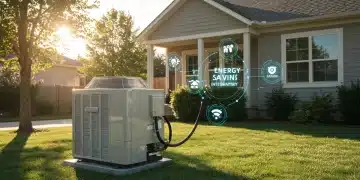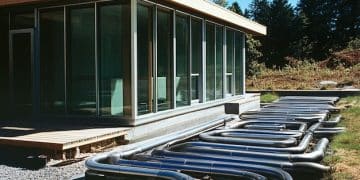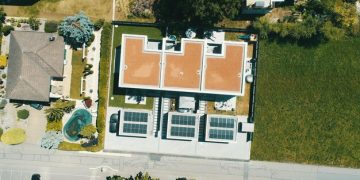Energy-saving HVAC system tips for efficient homes

Energy-saving HVAC system tips include regular maintenance, choosing efficient units, utilizing smart technologies, and optimizing insulation to enhance performance and lower energy costs.
Looking to cut down on energy costs? Energy-saving HVAC system tips can help improve your home’s efficiency while keeping your comfort intact. Let’s explore effective strategies to make your HVAC system work smarter.
Understanding HVAC systems and their role in energy efficiency
Understanding how HVAC systems work is crucial for enhancing energy efficiency in your home. An HVAC system, which stands for heating, ventilation, and air conditioning, plays a vital role in regulating indoor temperature and air quality. By grasping its components and functions, homeowners can make informed decisions to improve energy savings.
The Components of HVAC Systems
An HVAC system comprises several key parts that work together to provide comfort in your living space. These include:
- Furnace: This heats the air, pushing it through ducts.
- Air Conditioner: This cools the air for warmer months.
- Ventilation: This ensures air circulates effectively, providing fresh air while reducing humidity.
- Thermostat: This controls the temperature settings, allowing for precise adjustments.
Each component must operate efficiently to ensure minimal energy waste. Keeping them well-maintained is essential for optimal performance.
How HVAC Systems Contribute to Energy Efficiency
Properly functioning HVAC systems can make a significant difference in your energy consumption. An energy-efficient unit can lead to substantial cost savings. Regular maintenance, such as changing filters and checking ducts for leaks, helps the system perform at its best. Additionally, upgrading to a high-efficiency model can further reduce your utility bills.
Using a programmable or smart thermostat can also enhance efficiency. It allows you to set different temperatures according to your schedule, preventing unnecessary heating or cooling when you’re not home. This simple adjustment can save energy and improve your household’s overall efficiency.
The Importance of Insulation
Good insulation supports your HVAC system, minimizing energy loss. Ensuring that your home is properly insulated can help keep the desired temperature steady. It allows your HVAC system to perform efficiently, reducing the strain on the system and contributing to its longevity.
Incorporating energy-efficient windows can also enhance overall performance. Considering these aspects enables homeowners to maximize the benefits of their HVAC systems.
By understanding the integral parts and functions of HVAC systems, you can take actionable steps toward improving energy efficiency at home. Regular maintenance, modern technology, and proper insulation all play a part in this important goal.
Tips for regular HVAC maintenance

Regular maintenance of your HVAC system is essential for ensuring its efficiency and longevity. By following a few simple tips, homeowners can keep their systems running smoothly and save on energy costs.
Schedule Regular Inspections
It’s important to have your HVAC system inspected at least once a year, ideally before the peak seasons of heating and cooling. During these inspections, professionals can identify any potential issues before they become major problems. This proactive approach can save you money and ensure your system operates effectively.
Change the Filters
One simple yet effective maintenance task is changing the air filters regularly, typically every 1-3 months. Clogged filters can restrict airflow, causing your system to work harder and use more energy. A clean filter improves air quality and efficiency, paving the way for lower energy bills.
Clean the Condenser Unit
The outdoor condenser unit also requires attention. Keeping it clean from debris, leaves, and dirt helps maintain its efficiency. Clean the area around the unit and ensure there is enough space for airflow. Check the fins and coils, and clean them if necessary to promote optimal performance.
Check the Ducts
Ductwork can sometimes develop leaks, wasting energy and reducing efficiency. It’s wise to check for signs of wear and tear or gaps in the insulation. Properly sealing and insulating ducts can result in significant energy savings while enhancing comfort across your home.
After performing these maintenance tasks, consider using a programmable thermostat to manage your energy use better. This will help in maintaining the desired temperature without straining your HVAC system unnecessarily. Remember, taking these steps not only keeps your system running efficiently but also contributes to a healthier indoor environment.
Choosing energy-efficient units and features
Choosing energy-efficient units and features for your HVAC system can significantly impact both comfort and energy costs in your home. By selecting the right appliances, you can contribute to a greener environment while enjoying lower utility bills.
Look for Energy Efficiency Ratings
When shopping for HVAC units, always check the energy efficiency ratings. The Seasonal Energy Efficiency Ratio (SEER) for cooling and the Annual Fuel Utilization Efficiency (AFUE) for heating are good indicators of a unit’s efficiency. Higher ratings mean better efficiency and lower energy consumption.
Consider Smart Technologies
Incorporating smart technologies into your HVAC system enhances performance. Smart thermostats allow for automatic adjustments based on your routine. This means your system is not heating or cooling when you’re not home, saving energy. They can also provide insights into your energy usage, helping you make better choices.
Invest in Variable Speed Technology
Units with variable speed technology provide precise control over heating and cooling. Unlike traditional systems, they can adjust their output to match the home’s current needs. This reduces energy consumption and increases comfort levels. Furthermore, these systems operate more quietly, enhancing overall comfort.
Optimize Insulation and Sealing
Choosing energy-efficient HVAC systems works best when paired with good insulation and sealing. Ensure your home is well-insulated to maintain consistent temperatures. Check for drafts around windows and doors and seal them accordingly. An energy-efficient unit will perform much better in a well-sealed home.
Finally, consider the long-term savings that energy-efficient units can provide. Although they may have a higher upfront cost, the reduction in energy bills and potential rebates can lead to substantial savings over time. Making informed choices about your HVAC system not only boosts home comfort but also supports environmental conservation.
Smart technologies to optimize HVAC performance

Smart technologies are revolutionizing how we manage our HVAC systems. With advancements in technology, these solutions enhance performance, improve comfort, and maximize energy savings.
Benefits of Smart Thermostats
One of the primary tools in smart technology is the smart thermostat. These devices allow you to control your home’s temperature remotely via smartphone apps. Smart thermostats learn your habits and automatically adjust settings based on your preferences. This feature can significantly reduce energy waste.
Integration with Smart Home Systems
Smart HVAC systems can integrate with broader smart home technologies. When linked with other devices like smart lights and security systems, they provide a seamless user experience. For instance, your HVAC system can adjust when you leave home or when the security system is activated.
Monitoring Energy Usage
Another advantage of smart technologies is the ability to monitor energy consumption in real-time. Many smart thermostats provide insights into how much energy your HVAC system is using. Understanding this usage allows homeowners to make informed decisions about their heating and cooling habits.
Zone Control for Increased Efficiency
Smart HVAC systems often feature zone control, which enables specific areas of your home to be heated or cooled independently. This flexibility ensures that you are only using energy to condition rooms that are in use. It enhances comfort while also contributing to reduced energy bills.
Implementing these smart technologies into your HVAC system can lead to notable improvements in efficiency and comfort. With innovations constantly evolving, staying informed about the latest advancements will help you create a more energy-efficient home.
FAQ – Frequently Asked Questions about Energy-Saving HVAC Systems
How often should I perform maintenance on my HVAC system?
It’s recommended to perform maintenance at least once a year, ideally before the heating and cooling seasons, to keep your system running efficiently.
What are the benefits of using a smart thermostat?
Smart thermostats allow you to control your HVAC system remotely, learn your habits, and automatically adjust temperatures, helping to save energy and reduce costs.
What should I look for when buying an energy-efficient HVAC unit?
Look for high Seasonal Energy Efficiency Ratio (SEER) and Annual Fuel Utilization Efficiency (AFUE) ratings, as these indicators show how efficiently the unit operates.
How does proper insulation affect my HVAC system’s performance?
Good insulation helps maintain stable indoor temperatures, reducing the workload on your HVAC system, which in turn leads to energy savings and improved comfort.





